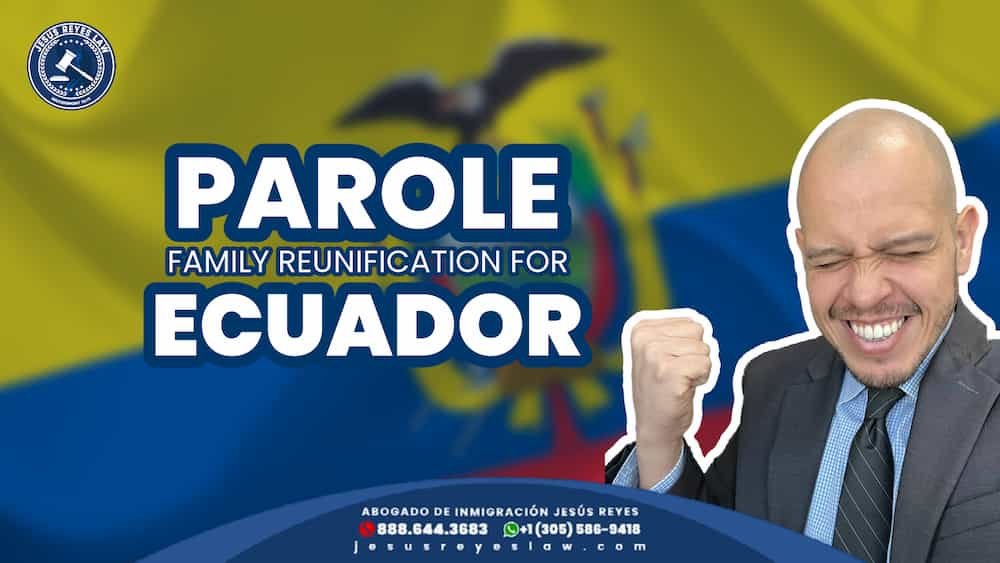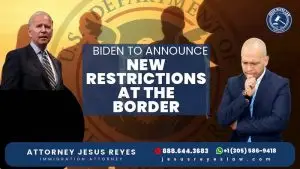The Department of Homeland Security of the United States (DHS) has announced a new parole process for the family reunification of certain Ecuadorian citizens. This measure is part of the strategy implemented by the Biden-Harris Administration to provide legal pathways and reduce irregular migration. The Parole for Family Reunification process aims to promote family unity and is framed within the comprehensive measures announced in April by the DHS and the State Department. These measures are consistent with the objectives set in the Los Angeles Declaration on Migration and Protection, which seek to strengthen national, regional, and hemispheric efforts to create conditions for safe, orderly, humane, and regular migration.
Family Reunification for Ecuadorian Citizens
The new parole process is aimed at Ecuadorian citizens whose relatives are United States citizens or legal permanent residents and have received approval to join their family in the United States. This process allows for the consideration of individual cases of Ecuadorian citizens and their direct relatives to grant them parole for a period of up to three years, while they wait to apply for legal permanent residency.
The Secretary of Homeland Security, Alejandro N. Mayorkas, emphasized that this Parole for Family Reunification process promotes family unity in a manner consistent with the laws and values of the United States. Moreover, Mayorkas highlighted that establishing this process for certain Ecuadorian citizens will allow more families to access legal pathways instead of falling into the hands of traffickers for a dangerous journey. Those who do not use the parole process for family reunification or other legal, safe, and orderly pathways, and try to enter the United States illegally, will continue to face harsh consequences.
Eligibility and Parole Process for Family Reunification
Ecuadorian citizens who are beneficiaries of an approved Form I-130, Petition for Alien Relative, may be considered for the parole process under this new program. Eligible beneficiaries must be outside the United States, meet all requirements, including security screenings and medical requirements, and must not have previously received an immigrant visa.
The Parole for Family Reunification process begins with the State Department issuing an invitation to the U.S. citizen or legal permanent resident who has filed the Form I-130 petition on behalf of an Ecuadorian beneficiary. Beneficiaries awaiting an immigrant visa may include certain children and siblings of U.S. citizens and certain spouses and children of legal permanent residents. The invited applicant can initiate the process by filing an application on behalf of the beneficiary and eligible family members, to be considered for advance travel authorization and parole.
The Parole for Family Reunification process grants parole only on an individual and temporary basis. For this, urgent humanitarian reasons or a significant public benefit must be demonstrated, as well as justification for a favorable exercise of discretion for the beneficiary. Individuals entering the United States under this parole process will generally be considered for parole for a period of up to three years and may apply for employment authorization while they wait for their immigrant visa to be available. Once their immigrant visa is available, they may apply for legal permanent residency.
Legal Authority for Parole
The Immigration and Nationality Act grants the Secretary of Homeland Security the discretionary authority to grant parole to applicants for admission to the United States on a temporary and case-by-case basis, for urgent humanitarian reasons or significant public benefit. Previous secretaries, under different administrations, have also exercised the parole authority to establish other family reunification parole programs administered by the United States Citizenship and Immigration Services. Examples of this are the Cuban Family Reunification Parole Program in 2007 and the Haitian Family Reunification Parole Program in 2014. The DHS announced new Parole for Family Reunification processes for Colombia, El Salvador, Guatemala, and Honduras in July, and the modernization of the Parole for Family Reunification processes for Cuba and Haiti in August.
The Federal Register Notice for this Parole for Family Reunification process is expected to be published soon, with detailed information on the application process and eligibility criteria.
____________
The new Parole for Family Reunification process for Ecuadorian citizens is part of the strategy implemented by the Biden-Harris Administration to provide legal pathways and reduce irregular migration. This measure promotes family unity and seeks to prevent individuals from falling into the hands of traffickers for dangerous journeys. By granting parole to certain Ecuadorian citizens and their families, they are provided with the opportunity to access legal pathways to reunite with their loved ones in the United States. Those attempting to enter illegally will continue to face severe consequences. It is important to stay tuned for the publication of the Federal Register Notice, which will provide more detailed information about the application process and eligibility requirements.
The strategy of combining expanded legal pathways and increased law enforcement is crucial for achieving safe, orderly, humane, and regular migration. With the Parole for Family Reunification process, the aim is to ensure that families can reunite safely and legally, avoiding unnecessary risks.










